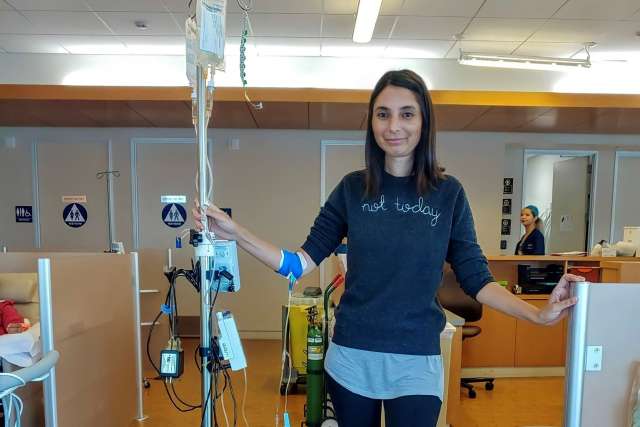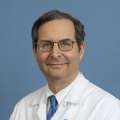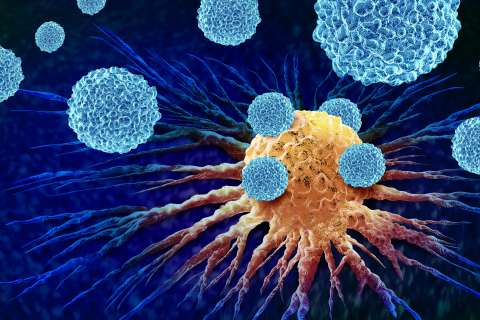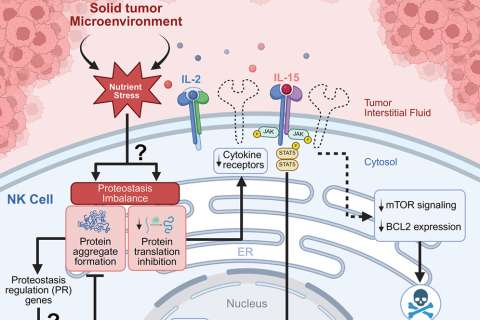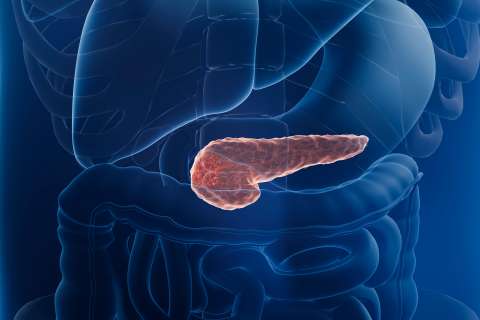In a TikTok video with thousands of views, Elizabeth Wachsberg wears a T-shirt that reads “colonoscopy enthusiast.”
In another video, this one with 2.4 million views, Wachsberg says researchers predict colon cancer will be the leading cause of cancer deaths among people age 20 to 49 in the next few years.
After being diagnosed with stage 4 colon cancer at age 38, Wachsberg has become an outspoken advocate for early screening, posting daily videos on TikTok @mystage4story.
She talks about the symptoms that led her to get screened, her experiences with chemotherapy and the latest research on colon cancer. She answers commenters’ questions, helps memorialize their loved ones lost to colon cancer and shares about the mental health challenges she experienced before and after her treatment. She also occasionally posts about her 15-year-old cat, Pete.
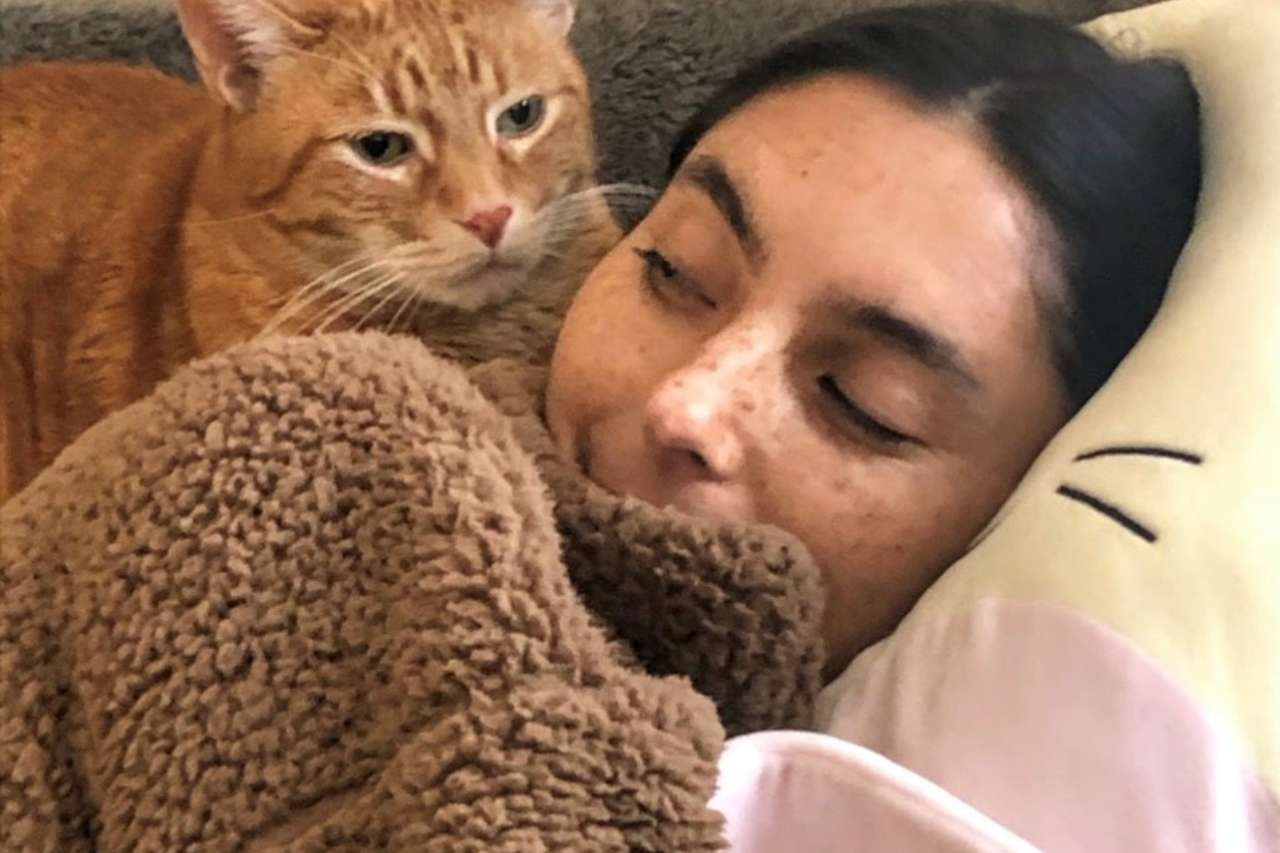
“Like a lot of people my age, I joined TikTok out of boredom,” says Wachsberg, now 42. “And then I made a video of what I wore to chemo — I think that was my first one — and it got 15,000 views.”
That inspired her to post hundreds more videos, which racked up thousands of views apiece. Her profile quickly gained thousands of followers, who directed their questions and concerns about colorectal cancer symptoms and screening to her.
“I got a TikTok message from this girl a couple of days ago, and she said, ‘I got a colonoscopy because of your videos and they removed three precancerous polyps,’” Wachsberg says. “‘The doctor says you saved my life.’”
Years of stomach trouble
Wachsberg had struggled with gastrointestinal issues since she was a child. She basically always had a stomachache after eating, she says.
The problems worsened as she got older, so she finally got a referral to a GI specialist. He suspected Wachsberg might have irritable bowel syndrome (IBS), but wanted her to have a colonoscopy to rule out other possible conditions, such as Crohn’s disease and colitis. But he left her health insurance network, so she had to start over.
Wachsberg found a new doctor, who diagnosed her with IBS and bacterial overgrowth (excessive bacteria in the small intenstine) and suggested she take an antibiotic daily for six months. He didn’t think she needed a colonoscopy.
So Wachsberg found another doctor. This one again recommended colonoscopy to rule out Crohn’s or colitis. Again, the insurance company declined to completely cover the costs, which would have left Wachsberg responsible for several thousand dollars, she says.
Wachsberg was 37 years old then. Insurance companies in the U.S. are required to cover colonoscopy exams beginning at age 45. The minimum age was recently lowered from 50 because of increasing incidence of colorectal cancer in younger people.
Then, in March of 2019, Wachsberg was at work — she’s a stand-in for TV and film productions — when she felt an unusual pain on her left side. It felt like she’d pulled a muscle, but she knew she hadn’t done anything that might have caused it.
A couple of days later, the pain intensified. Wachsberg went to see another GI doctor. He recommended she have a colonoscopy.
“The next morning, I woke up in the most pain I’ve ever been in in my entire life,” she says.
She went to work but found she couldn’t stand upright. On her way back home, the GI doctor called to say the inflammation markers in her blood were alarmingly high. She told him she’d be in two days later for her scheduled colonoscopy.
But the following morning, she went to the bathroom and the toilet filled with blood.
An unexpected diagnosis
Wachsberg called her father, a physician, who said she ought to have a CT scan right away. He also told her he’d be coming down from Northern California to take her to her colonoscopy.
He arrived at UCLA Health that afternoon during her CT scan.
The two had just gotten back to Wachsberg’s apartment when her doctor called.
“He said, ‘You have a tumor in your colon and spots on your liver and you have to go to the hospital,’” she recalls.
“Oh, I’m dying,” she thought to herself.
She’d had friends with cancer. Anytime the disease spread to other organs, she’d learned, “it’s just a matter of time.”
Wachsberg underwent three rounds of chemotherapy, then surgery to remove the tumor in her colon and half of her liver.
As she began to grasp the gravity of her diagnosis, she posted on Facebook about what she was going through. Friends connected her with other young women facing similar diagnoses, and they started a group text chain to support each other.
Wachsberg emerged from surgery on July 1, 2019 with an excellent prognosis. Her tumor had shrunk and all the cancer cells in her body appeared to be dead. She would still have to go through five more rounds of chemotherapy, but things were looking good. Her cancer was in remission.
As she continued her treatment, however, one by one, the women in her text chain died. All were in their 30s.
“I was really struggling,” Wachsberg says. “It sent me into a very deep depression and survivor’s guilt. I was having a lot of anxiety and panic attacks.”
She got treatment through the Simms/Mann-UCLA Center for Integrative Oncology, which offers therapy and other psychosocial support services for people with cancer and their families.
And then she went on TikTok.
“I just sort of went, ‘Nobody talks about how after treatment can be worse than the actual treatment,’” Wachsberg says. “Nobody prepares you for after, because they’re so focused on the treatment and what they’re going to do. I was not prepared.”
Finding community online
Making videos about her experience offered an outlet.
“Every time I would make a video, people would comment: My brother got colon cancer at 35 and died; my mother got colon cancer at 65 and died; my friend got colon cancer at 27 and died,” Wachsberg says. “All these people would start writing about all the people they knew that had been affected by colon cancer. And then you have other people saying they didn’t know younger people could get colon cancer.”
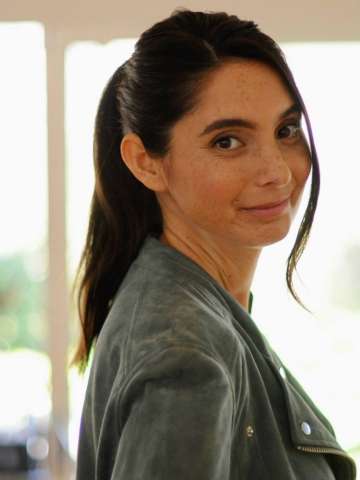
The incidence of colorectal cancer in younger patients has doubled in recent decades, says Wachsberg’s oncologist, J. Randolph Hecht, MD, director of the GI Oncology Program at UCLA Health and a member of the UCLA Jonsson Comprehensive Cancer Center.
According to the American Cancer Society, cases of colorectal cancer among people younger than 50 have increased by 9% since 2020. Researchers have yet to identify why.
“While the age of screening has dropped to 45, we are seeing much younger patients — into the 20s and teens,” Dr. Hecht says. “It is very important for younger patients to know their family history and to let doctors know if they have bleeding or rectal pain. It’s important for doctors not to ignore these symptoms, even in young patients, as they may be from colorectal cancer. The earlier the cancer is found, the more curable it is.”
Wachsberg uses TikTok to spread the word about colon cancer symptoms, the increased incidence of the disease in younger people and the importance of colonoscopy exams. She talks about how to get through chemotherapy and tries to normalize that low moods are a standard part of the cancer journey.
“One of the main things I tell people is: It’s OK to have a bad day. It’s OK to not get out of bed or not get off the couch. It’s OK if all you accomplished that day is waking up. If that’s it, that’s fine, then you’ve won the day,” she says. “Some days, there is no sunshine and that’s OK. You don’t have to force positivity.”
Wachsberg dreams of creating a platform to provide real-time answers and support to people experiencing cancer — maybe a phone line where folks could leave a message about what’s concerning them and get a call back, or an interactive online group where people at different stages of the cancer journey could offer insight and comfort to others.
For now, though, she continues to post daily videos and connect through social media.
“I had an experience that a lot of people don't have the privilege of living through. And at the moment, I'm living through it,” she says. “I find that what makes me feel OK about still being alive when my friends aren’t, when their children don't have their mothers anymore, is that if I make a difference for other people, if I can do something to help other people, then it will give meaning to why I'm still here.”
